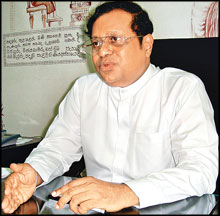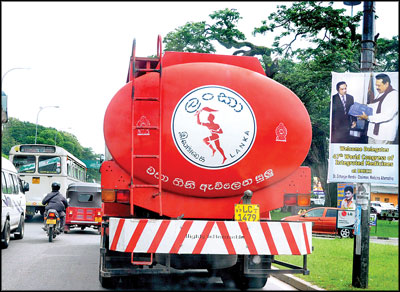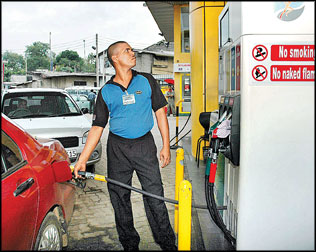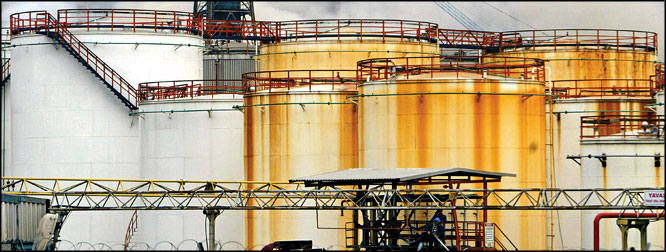CPC management needs complete overhaul - Minister Susil
Premajayantha
By L.S. Ananda KANNANGARA
|

Minister Susil Premajayantha
|
Inefficiency in management is the main cause for the bankruptcy of
most of the State enterprises, said Petroleum Industries Minister and
United People's Freedom Alliance (UPFA) General Secretary Susil
Premajayantha.
In his interview with the Sunday Observer Minister Premajayantha
referring to the present crisis of the Ceylon Petroleum Corporation said
that the Corporation has sought financial assistance from the Treasury
to tide over the difficulties. Excerpts of the interview:
Q: The rumour is that the government will soon increase the
prices of petrol and other petroleum products. Your comments.
A: The world market prices of crude oil and refined oil have
increased by 20 percent during the past six months.
A barrel of refined oil increased from US$ 100-105 to US$ 125-130 and
a barrel of crude oil from US$ 80-85 to US$ 100-112 during the past six
months. Escalation of prices were due to the prevailing political
instability in the Middle East and the war in Libya.
 |
| A CPC petrol
bowser |
 |
| A filling
station |
Q: The Opposition alleges that the government has imposed
heavy taxes on petrol, diesel and kerosene which has resulted in price
escalation.
A: No, it is not factually correct. No taxes have been imposed
on kerosene at all. Long ago a Rs. 25 tax per petrol litre and Rs. 2.50
per kerosene litre were imposed by the government. The present
government did not impose taxes on petroleum products as alleged very
often by UNP MP Ravi Karunanayake.
Q: Is it true that the Ceylon petroleum Corporation incurs
heavy losses daily?
A: The CPC loses Rs. 2, Rs. 41 and Rs. 33 on each litre of
petrol, kerosene and diesel. The CPC losses are estimated at Rs. 12,320
million in 2009 and Rs. 26,920 million in 2010.
Q: What steps have been taken to arrest this situation.
A: In the business world the farsighted entrepreneurs
introduce new strategies for speedy recovery from economic woes. The CPC
was advised to go back to its earlier business such as bunkering,
lubricants and tar business. The Board of Directors is empowered to do
profitable businesses in the petroleum field under the CPC Act of 1961.
There have been no objection to implement or re launch the above
mentioned businesses which are being handled by the private sector
viability at present but the CPC has not launched any such ventures, due
to reasons not known. On the other hand, the key positions such as Chief
Executive Officer (CEO) or General Manager, Financial Controller have
fallen vacant while arrangements have been made to cover the duties of
Marketing Manager, Legal Manager, Commercial Manager and the Treasurer.
Q: Is it not the responsibility of the Ministry to streamline
the management of the Corporation. Should not all those responsible for
these lapses on their part be dealt with and put the corporation back on
track?
A: Nothing positive has happened despite Ministry directives.
I strongly feel that the CPC needs a restructuring soon to overcome this
rapidly deteriorating situation. The present organisational structure
needs to be overhauled; marketing should be the first priority of a
trading organisation. This is immensely true of the CPC. All vacancies,
especially the key positions should be filled by competent people.
Q: Recent newspaper reports had brought to light 23 government
institutions and corporations including the CPC which have failed in
their business. The treasury has to bear the brunt of the monthly
salaries of their staff. As an MBA holder and also one who is conducting
research for his PHD in Management, what is your opinion about this
situation?
A: Most of these bankrupt government ventures earned profits
under efficient managements. Even the CPC had earned Rs. 3,800 million
profit in 2005, when I was the Minister of Power and Energy. There is no
alternative but to appoint competent people with a flair for management
for responsible posts.
|

Oil tanks |
Q: The wrong political decisions could be attributed to the
present predicament of the CPC. The Ceylon Petroleum Storage Terminal
Pvt Ltd. (CPSTL) is a separate organisation which runs the Kolonnawa Oil
Storage, would you like to explain its present role?
A: When CPC was privatised in 2002 the then UNP government set
up the CPSTL which mainly depends on CPC and SLIOC's servicing charges.
Since the SLIOC imports oil from India via Trincomalee the CPSTL lost
its income and now it depends heavily on CPC's servicing charges.
Under the provisions of the Act by which the CPSTL was setup its
activities cannot be audited by the Auditor General.
This special provision should be removed from the Act.
There should not be exception to the rule that the accounts of all
State Corporations ought to be audited by the government Auditor. No
transparency could be guaranteed at all under the present setup.
I am totally dissatisfied with the manner which the CPC and CPSTL are
presently managed. These ventures should be restructured to make them
commercially viable .
|

